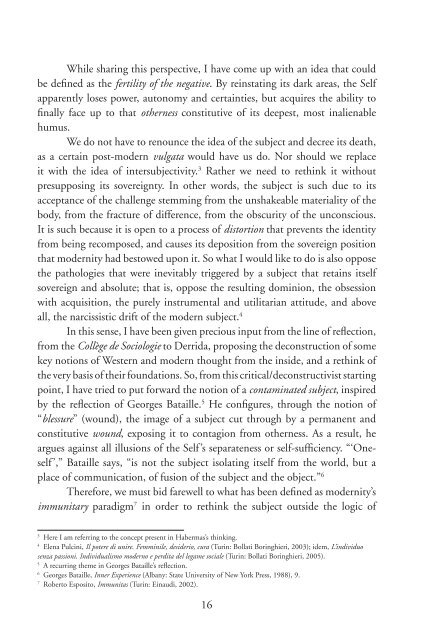Teaching Subjectivity. Travelling Selves for Feminist ... - MailChimp
Teaching Subjectivity. Travelling Selves for Feminist ... - MailChimp
Teaching Subjectivity. Travelling Selves for Feminist ... - MailChimp
Create successful ePaper yourself
Turn your PDF publications into a flip-book with our unique Google optimized e-Paper software.
While sharing this perspective, I have come up with an idea that could<br />
be defined as the fertility of the negative. By reinstating its dark areas, the Self<br />
apparently loses power, autonomy and certainties, but acquires the ability to<br />
finally face up to that otherness constitutive of its deepest, most inalienable<br />
humus.<br />
We do not have to renounce the idea of the subject and decree its death,<br />
as a certain post-modern vulgata would have us do. Nor should we replace<br />
it with the idea of intersubjectivity. 3 Rather we need to rethink it without<br />
presupposing its sovereignty. In other words, the subject is such due to its<br />
acceptance of the challenge stemming from the unshakeable materiality of the<br />
body, from the fracture of difference, from the obscurity of the unconscious.<br />
It is such because it is open to a process of distortion that prevents the identity<br />
from being recomposed, and causes its deposition from the sovereign position<br />
that modernity had bestowed upon it. So what I would like to do is also oppose<br />
the pathologies that were inevitably triggered by a subject that retains itself<br />
sovereign and absolute; that is, oppose the resulting dominion, the obsession<br />
with acquisition, the purely instrumental and utilitarian attitude, and above<br />
all, the narcissistic drift of the modern subject. 4<br />
In this sense, I have been given precious input from the line of reflection,<br />
from the Collège de Sociologie to Derrida, proposing the deconstruction of some<br />
key notions of Western and modern thought from the inside, and a rethink of<br />
the very basis of their foundations. So, from this critical/deconstructivist starting<br />
point, I have tried to put <strong>for</strong>ward the notion of a contaminated subject, inspired<br />
by the reflection of Georges Bataille. 5 He configures, through the notion of<br />
“blessure” (wound), the image of a subject cut through by a permanent and<br />
constitutive wound, exposing it to contagion from otherness. As a result, he<br />
argues against all illusions of the Self’s separateness or self-sufficiency. “‘Oneself’,”<br />
Bataille says, “is not the subject isolating itself from the world, but a<br />
place of communication, of fusion of the subject and the object.” 6<br />
There<strong>for</strong>e, we must bid farewell to what has been defined as modernity’s<br />
immunitary paradigm 7 in order to rethink the subject outside the logic of<br />
3<br />
Here I am referring to the concept present in Habermas’s thinking.<br />
4<br />
Elena Pulcini, Il potere di unire. Femminile, desiderio, cura (Turin: Bollati Boringhieri, 2003); idem, L’individuo<br />
senza passioni. Individualismo moderno e perdita del legame sociale (Turin: Bollati Boringhieri, 2005).<br />
5<br />
A recurring theme in Georges Bataille’s reflection.<br />
6<br />
Georges Bataille, Inner Experience (Albany: State University of New York Press, 1988), 9.<br />
7<br />
Roberto Esposito, Immunitas (Turin: Einaudi, 2002).<br />
16

















